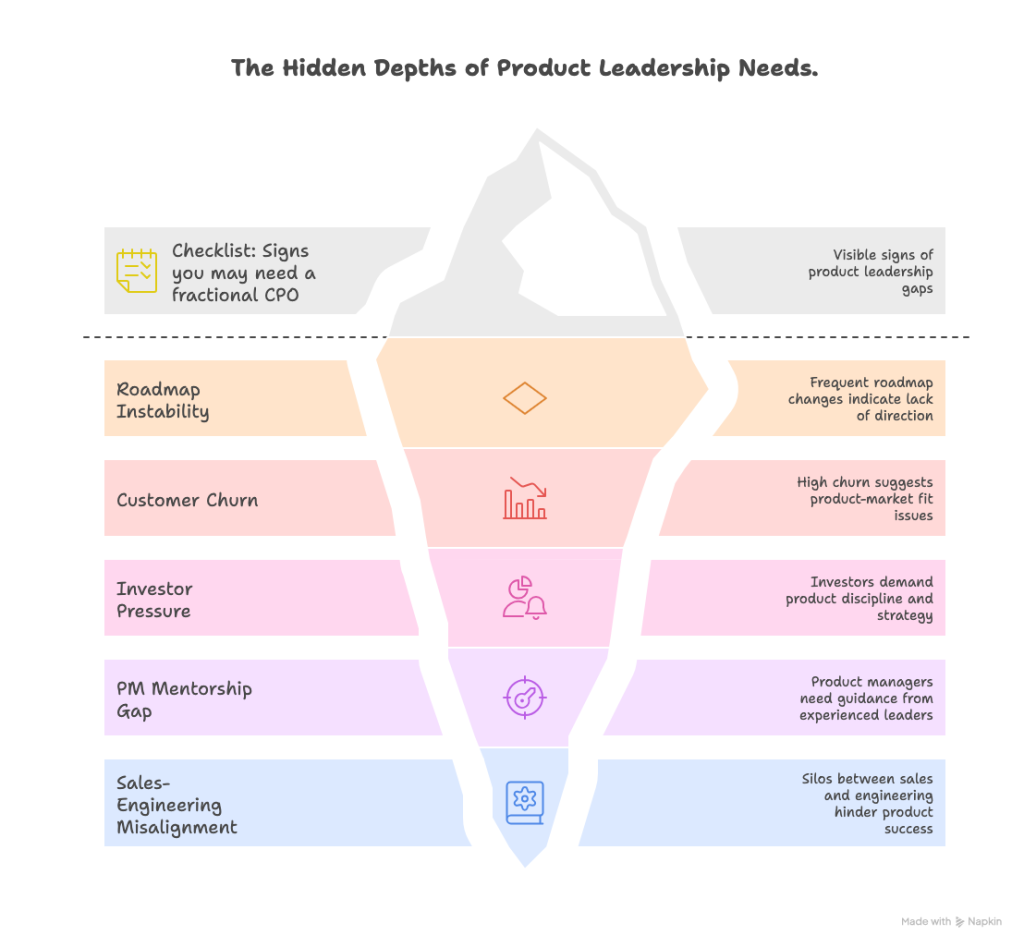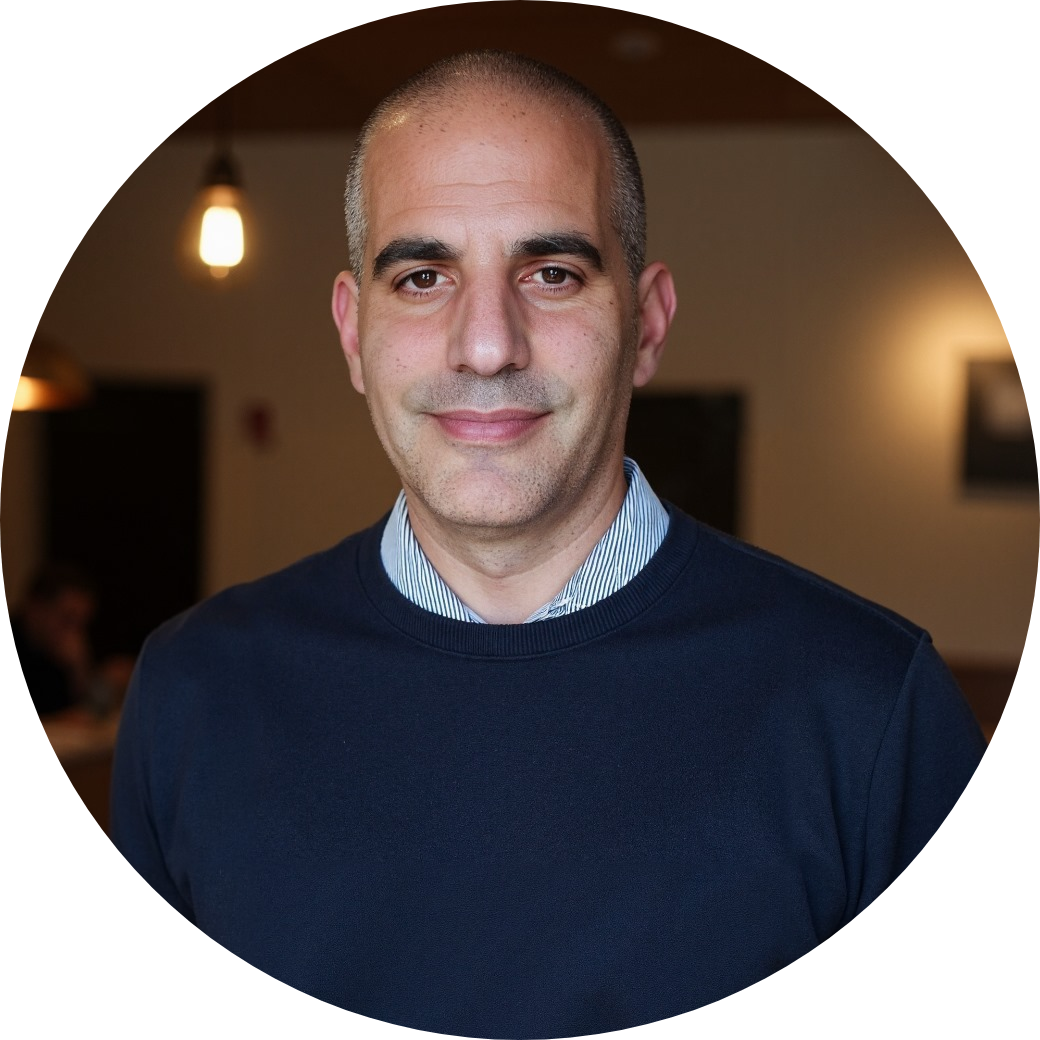What is a Fractional CPO? The Complete Guide for Growth-Stage SaaS Companies
September 23, 2025 • 8 min read

Last Updated on February 4, 2026 by Sivan Kadosh
Scaling a SaaS company is messy. You have a product that works, paying customers, and a growing team, but priorities feel scattered. Your engineers are asking for clarity, your sales team is promising features that are not on the roadmap, and investors are pushing for faster growth. You know you need senior product leadership, but hiring a full-time Chief Product Officer is expensive and often premature at this stage.
This is where a fractional CPO can step in. Acting as an on-demand product executive, a fractional CPO brings the expertise of a senior leader without the full-time cost or commitment. For growth-stage founders juggling competing demands, this model offers a practical way to align product strategy with business outcomes.
Key Takeaways:
- A fractional CPO is a part-time executive who brings high-level product leadership to growth-stage companies.
- The role differs from interim CPOs or product consultants by combining ongoing strategy with flexible engagement.
- Hiring a fractional CPO makes sense when you need executive-level product guidance but cannot justify a full-time hire.
- Costs are significantly lower than a full-time CPO, with typical engagements structured around days per week or project-based work.
- Risks such as limited availability or authority gaps can be mitigated with clear contracts and communication.
- The model is growing in popularity as SaaS companies embrace remote work, tighter budgets, and leaner leadership teams.
What is a fractional CPO?
A fractional Chief Product Officer (CPO) is an experienced product leader who works with a company part-time or on a contractual basis. They take on many of the responsibilities of a full-time CPO, such as setting product vision, aligning roadmaps with business goals, and mentoring product teams, but without being permanently embedded in the company.
This role is especially useful for founders who know they need executive product leadership but are not ready for the cost or commitment of a full-time executive. Unlike consultants, who tend to deliver specific recommendations and move on, fractional CPOs stay engaged to drive outcomes. Unlike interim CPOs, who often hold the fort between permanent hires, fractional CPOs are intentionally part-time and can work with multiple companies at once.
Quick comparison: Fractional CPO vs interim CPO vs consultant
| Role | Description |
| Fractional CPO | Ongoing, part-time executive leadership |
| Interim CPO | Temporary, full-time stand-in during leadership gaps |
| Consultant | Short-term, project-specific advice without execution |
Why growth-stage companies turn to fractional CPOs
The messy middle of SaaS growth often exposes weak points in product leadership. Founders who once managed the roadmap themselves suddenly struggle to balance product priorities with sales, fundraising, and hiring.
Common reasons companies turn to fractional CPOs include:
Stop guessing. Start calculating.
Access our suite of calculators designed to help SaaS companies make data-driven decisions.
Free tool. No signup required.
- Scaling challenges: Growing from product-market fit to repeatable revenue.
- Chaotic priorities: Too many initiatives without a clear product strategy.
- Team mentorship needs: Junior product managers require senior guidance.
- Budget constraints: A full-time CPO’s salary and equity package are often out of reach.
- Investor pressure: Boards expect more disciplined product leadership.
By engaging a fractional CPO, companies can bring in senior leadership without the overhead. The flexibility to engage on a part-time basis makes this model attractive when financial resources are limited but the need for expertise is high.
When does hiring a fractional CPO make sense?
A fractional CPO is not for every company. The model works best when:
- Your company has between 20 and 200 employees.
- You are approaching or have just raised a Seed or Series A round.
- Product-market fit is established but scaling feels difficult.
- Your churn rate is climbing or customer feedback loops are slow.
- The product team has grown beyond what founders can manage directly.
Checklist: Signs you may need a fractional CPO
- The roadmap changes weekly.
- Customer churn is higher than you want.
- Investors are asking for product discipline.
- Your product managers lack senior mentorship.
- Sales and engineering are misaligned.
If several of these resonate, a fractional CPO could be the right move for you.

My unpopular opinion as a former CEO & CPO:
Let’s be blunt: for a growth-stage SaaS, choosing not to hire a CPO isn’t really an option. In many ways, it’s a death sentence for your product.
You can build a product, raise money, and spend a fortune on marketing, but without someone obsessively focused on understanding your customers – their pains and their real needs – you will fail to achieve perfect product-market fit. This isn’t just a theory, it’s a statistical reality. According to a landmark study by CB Insights, the #1 reason startups fail is “No Market Need,” accounting for 35% of all failures. That’s the direct result of not having a leader whose sole job is to bridge the gap between your product and your customers.
I’ve seen it happen. Without this foundational product work, the road to shutting down your business is almost guaranteed. Companies that excel at customer-centricity are 60% more profitable than those that don’t, according to research from Bain & Company. A great fractional CPO isn’t just a role you fill; they are the insurance policy for your entire venture.
How a fractional CPO works in practice
Fractional CPOs tailor their engagements to company needs, but common responsibilities include:
- Defining or refining product vision and strategy.
- Aligning the roadmap with revenue and growth goals.
- Coaching and mentoring product managers.
- Leading discovery and validation processes.
- Acting as a bridge between product, engineering, sales, and leadership.
Engagement models:
- Retainer: 1–3 days per week on an ongoing basis.
- Project-based: Focused on specific deliverables such as roadmap design.
- Hybrid: Retainer for strategy plus project work when needed.
Clear KPIs should always be defined. Examples include reducing churn, improving roadmap predictability, or accelerating time to market.
Costs and compensation benchmarks
Hiring a fractional CPO is far less costly than bringing on a full-time executive.
- Full-time CPO: $250K–$350K annually in salary, plus equity.
- Fractional CPO (US/UK): $200–$400 per hour, or $8K–$20K per month depending on commitment.
- Fractional CPO (Europe/Asia): Often lower, typically $100–$250 per hour.
For a startup, this flexibility is crucial. Instead of locking into a long-term executive contract, you can pay for the exact level of leadership you need at your current stage.
Challenges of hiring a fractional CPO
Like any model, fractional product leadership has drawbacks:
- Limited availability: They may split time between multiple clients.
- Authority gaps: Internal teams may resist a part-time leader.
- Culture fit: Building trust quickly is critical but not guaranteed.
- Transition risks: Knowledge can be lost when engagements end.
To mitigate these risks:
- Set clear scope and responsibilities in writing.
- Establish regular communication cadences.
- Involve them in leadership meetings to ensure authority.
- Document decisions and handovers to prevent knowledge gaps.
How to hire the right fractional CPO
Not all fractional leaders are equal. What you should look for:
- A proven track record scaling SaaS products.
- Ability to operate hands-on with teams, not just at the advisory level.
- Experience with your business model and stage.
- Strong references from previous engagements.
Key questions to ask a fractional Chief Product Officer
- How do you typically structure engagements?
- What metrics do you use to measure success?
- How do you ensure alignment with internal teams?
- Have you worked with companies of our size and stage before?
Becoming a fractional CPO (for practitioners)
For product leaders considering a fractional career, the move can be both exciting and challenging. Stepping into this role means trading the security of a single employer for the flexibility of working with multiple companies. It offers the chance to apply your skills across different industries, solve a variety of growth-stage problems, and design a career on your own terms.
At the same time, it requires a shift in mindset, from being deeply embedded in one organization to balancing priorities across several. This path is best suited for senior product professionals who thrive on variety, enjoy coaching teams, and are comfortable operating independently while driving measurable outcomes.
Key recommendations for product leaders considering a fractional career:
- Build credibility with strong case studies and references.
- Specialize in a niche (e.g., B2B SaaS, fintech, marketplaces).
- Create repeatable frameworks for onboarding and delivery.
- Be proactive about pipeline management to avoid feast-and-famine cycles.
The lifestyle offers flexibility but requires strong self-management and business development skills.
Future of the fractional CPO role
Fractional executive leadership is becoming mainstream. As companies tighten budgets and embrace distributed work, on-demand models are gaining traction.
Trends shaping the role include:
- Remote-first work: Easier for fractional leaders to integrate across borders.
- Fractional agencies and platforms: Growing marketplaces for part-time executives.
- AI tools: Helping fractional CPOs analyze data, streamline decision-making, and work efficiently with multiple clients.
- Sustainable careers: More leaders are choosing fractional paths long-term instead of full-time executive roles.
The model is likely to expand beyond startups into mid-market companies and even traditional industries.
Conclusion
Fractional CPOs offer growth-stage companies the chance to access top-level product leadership without the burden of a full-time hire. They bring clarity, discipline, and strategic direction at a time when founders need it most. While the model comes with some trade-offs, clear expectations and communication can ensure strong outcomes.
If you are a founder or CEO struggling with product chaos, churn, or growth bottlenecks, working with a fractional CPO can give you the strategic clarity you need without the full-time cost.
Our fractional CPO services are designed to help SaaS companies align their product strategy with business goals, mentor their teams, and accelerate growth.
Schedule a free consultation today and discover how fractional leadership can unlock your next stage of growth.

Sivan Kadosh is a veteran Chief Product Officer (CPO) and CEO with a distinguished 18-year career in the tech industry. His expertise lies in driving product strategy from vision to execution, having launched multiple industry-disrupting SaaS platforms that have generated hundreds of millions in revenue. Complementing his product leadership, Sivan’s experience as a CEO involved leading companies of up to 300 employees, navigating post-acquisition transitions, and consistently achieving key business goals. He now shares his dual expertise in product and business leadership to help SaaS companies scale effectively.